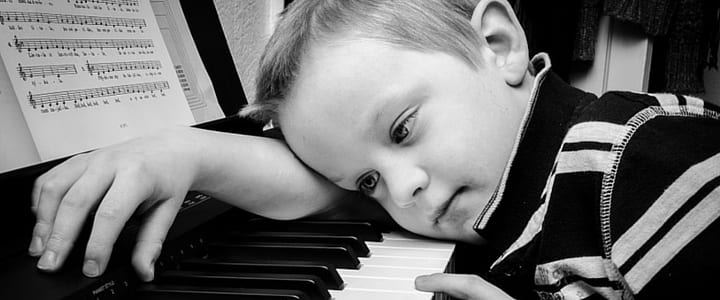Are you having trouble getting your child to practice the piano in between lessons? Below, piano teacher Sally H. outlines five tips on how to encourage your child to practice piano more often…
You’ve signed your child up for piano lessons and her new instructor encourages you to have her practice piano every day at home.
Your child, however, is giving you a hard time whenever you ask her to practice piano.
Many parents face this same exact scenario. They pay for piano lessons, but can’t seem to get their child to practice the recommended amount of hours per week.
So, how can you increase the likelihood that your child will play daily and be prepared for his/her lesson every week?
Below are five tips for ensuring your child develops into a responsible piano student.
1. Use the Word Play
Rather than say “It’s time to practice piano,” change your wording and say “It’s time to play the piano.” The word “play” is a good word, as it activates all sorts of fun images in a child’s head.
Speaking of play, there are a ton of piano practice games you can play with your child; for example, musical jenga, lego chords, and bingo! For a complete list of 20+ piano practice games, click here.
2. Be Creative
Add creativity to your child’s assignments; for example, ask him or her to write you a short song. Even if it’s just a few notes of their own, your child will feel proud to express his or her personal creativity.
Join in on the fun and be an active and enthusiastic listener. Your child will learn that creating music generates good feelings, and practicing piano can actually be fun!
3. Find the Right Teacher
A concert pianist’s credentials may look good on paper, but he or she may not be the best teacher for your beginner student. The effectiveness of beginner piano lessons is all about a good match of personalities between child and instructor.
Watch your child leave the lesson. Is he or she smiling, skipping, laughing, dancing? Or is he or she walking with his or her head down, looking bewildered, frightened, or dare I say, crying?
Piano lessons should be an exercise in positive learning. Don’t settle for anything less.
4. Create a Pleasant Environment
Where is the piano located in your home? Is it in the cold, gloomy basement or in the family room near the television?
The piano should be placed in a room where there is a reasonable amount of privacy, but not in a place that makes the student feel secluded.
A piano in the dining room is a beautiful addition. A keyboard in a teenager’s bedroom creates some wonderful private moments.
Placement of the piano should be in a special area where the student is happy and comfortable.
5. There’s No Room for Criticism
Be an appreciative audience. Criticism is very difficult for a young artist to endure when they are learning.
As a parent, your responsibility is to notice the positive elements and reward learning efforts. For example, reward your child with a special treat every time he or she practices for 30 uninterrupted minutes.
Beginner piano lessons should be associated with the positive aspects of achievement. Happy memories create lifelong playing of a beloved instrument.
You play a big role in your child’s musical development and success. Help your child practice piano with the helpful tips and tricks above!
 Post Author: Sally H.
Post Author: Sally H.Sally H. began her teaching career at Karnes Music in Schaumburg prior to opening her private All Age Piano Studio in Wauconda, which is located in Lake County, IL. Learn more about Sally here!
The post 5 Tips on How to Get Your Child to Practice Piano appeared first on | TakeLessons.

